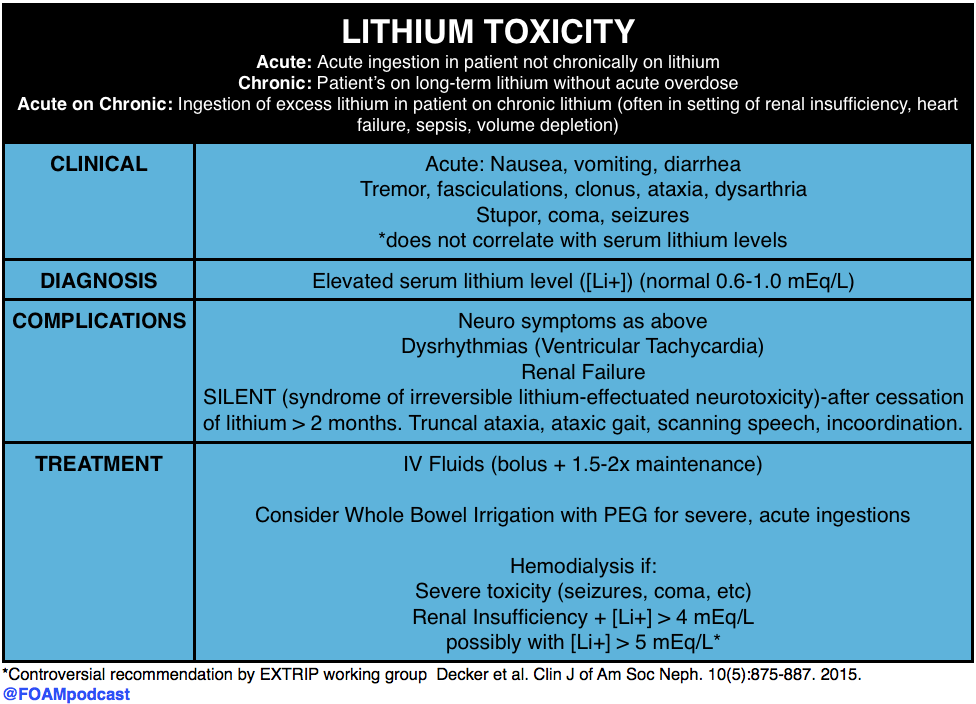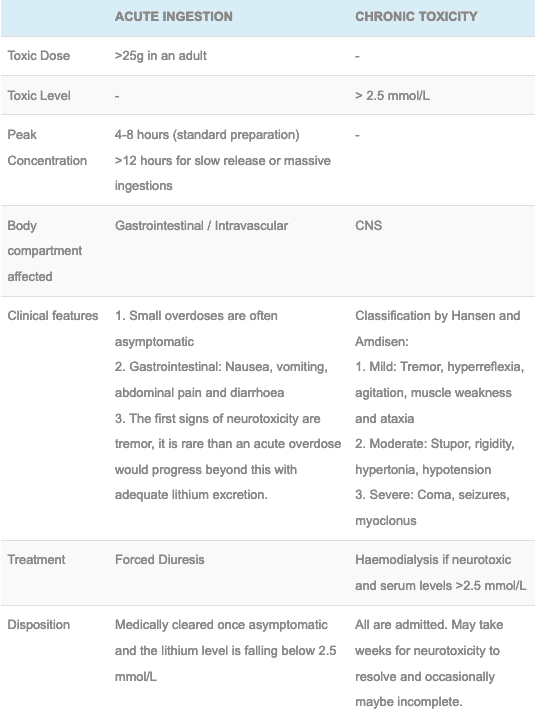What Drugs Can Cause Lithium Toxicity
Lithium toxicity or lithium overdose can occur when a person takes too much of a mood-stabilizing medication that contains lithium. If you take way too much at once youre at risk of an acute lithium toxicity.
 Episode 57 Lithium Toxicity Rhabdomyolysis Foamcast
Episode 57 Lithium Toxicity Rhabdomyolysis Foamcast
A decreased intake of sodium salt can also lead to lithium toxicity.

What drugs can cause lithium toxicity. Less caffeine can cause your lithium levels to rise while more can cause it to lower. Toxicity includes impaired urinary concentrating ability nephrogenic diabetes insipidus the most common cause of drug-induced nephrogenic diabetes insipidus sodium-losing nephritis nephrotic syndrome along with other manifestations is prescribed. Important examples are diuretics ACE inhibitors and NSAIDS.
15092008 Certain drugs are inherently nephrotoxic and include aminoglycosides amphotericin B cisplatin contrast dye and cyclosporine7 34 For. 20112020 Renal toxicity is more common in patients on chronic lithium treatment. Toxicity includes impaired urinary concentrating ability nephrogenic diabetes insipidus the most common cause of drug-induced NDI sodium-losing nephritis nephrotic syndrome along with other manifestations is prescribed.
Note that this patient was taking two out of three of these. Chronic toxicity occurs over a lengthy period of time when a person takes too much lithium but not enough to cause significant immediate effects. Renal toxicity is more common in patients on chronic lithium treatment.
What are the. Ref. 17122016 Additionally lithium-treated patients should be queried regularly about their potential use of other medications that may interfere with lithium excretion and therefore increase the likelihood of lithium toxicity such as ACE inhibitors nonsteroidal anti-inflammatory medications such as diclofenac indomethacin and COX-2 inhibitors such as celecoxib.
Lithium even without any drug interactions can be toxic if your overdose on the medication. 13062020 Long-term treatment may cause permanent kidney changes and impairment of renal function. This situation occurs as a combination of both types of lithium toxicity.
Chronic lithium toxicity chronic overdose. High serum concentrations andor acute lithium toxicity may worsen these changes. Loop diuretics and potassium-sparing agents have minor variable effects.
It can also occur if you are dehydrated or you take medicines that cause lithium to build up in your blood. Drugs that potentially cause renal impairment can make this worse or even precipitate lithium toxicity on their own. Over time the buildup of the drug produces toxic results.
29 Neuroleptics and lithium Lithium can to lead to an encephalopathy char acterized by seizures choreiforme as well as parkinsonian movements with cerebellar signs. Severe tremor could indicate lithium toxicity. It can also develop when the.
These medicines may include NSAIDs certain blood pressure medicines and medicines used to treat epilepsy. Alcoholic beverages can have a negative effect on many medications. 13042016 The drug is known to cause a.
Nonsteroidal anti-inflammatory drugs NSAIDs have also been associated with lithium toxicity although the relative interactive potential of specific NSAIDs is difficult to determine. Three risk factors contribute to lithium toxicity. 04032021 Toxicity can also be caused by taking a slightly higher dose of lithium over time.
The time lag between initiation of lithium and the onset of tremor can obscure the role of lithium. A nephrogenic diabetes insipidus age over 50 years and thyroid dysfunction Smith et al 2003.
 Lithium Toxicity Litfl Toxicology Library Toxicants
Lithium Toxicity Litfl Toxicology Library Toxicants
 Notable Side Effects Associated With Mood Stabilizers Lithium Lithium Download Table
Notable Side Effects Associated With Mood Stabilizers Lithium Lithium Download Table
Comments
Post a Comment